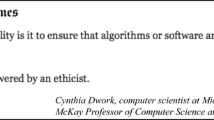Abstract
The relevance of different concepts of computer software (henceforth SW) rights is analysed from the viewpoint of divergent sociopolitical doctrines. The question of software rights is considered from the ontological assumptions, on one extreme, to the relevance of current practical applications of SW rights (such as copyright and patent), on the other extreme. It will be argued (from a non-descriptive/non-cognitive account) that the current expression of SW rights in Western societies (namely copyright, excluding patent) can be seen to be fair from the viewpoint of the theses of agreed rights and universalisability. Finally, given that such practice is neither immoral, nor irrelevant-but fair (based on the ad ignorantiam argument)-we have good reason to respect it rather than violate or demolish it.
Similar content being viewed by others
References
Airaksinen, T. (1987). Moraalifilosofia [Moral Philosophy], 2nd edn. WSOY, Porvoo (in Finnish).
Bowyer, K.K. (1995). Ethics and Computing: Living Responsibility in a Computerized Word. IEEE Computer Society Press, Los Alamitos, CA, USA.
Floridi, L. (1998). Does Information have a Moral Worth in Itself? Computer Ethics: Philosophical Enquiry (CEPE '98), in Association with the ACMSIG on Computers and Society, London School of Economics and Political Science, London, 14–15 December 1998.
Floridi, L. (1999). Information Ethics: On the Philosophical Foundation of Computer Ethics,Ethics and Information Technology. 1(1). 37–56.
Gewirth, A. (1978), Reason and Morality. University of Chicago Press, Chicago, IL.
Hare, R.M. (1952). The Language of Morals. Clarendon Press, Oxford, UK.
Hare, R.M. (1963). Freedom and Reason. Oxford University Press, Oxford, UK.
Hare, R.M. (1976). Some Confusions about Subjectivity. In Bricke, J. (ed.)Freedom and Morality. Kansas University Press.
Hare, R.M. (1981). Moral Thinking: Its Levels, Methods and Point. Clarendon Press, Oxford, UK.
Hare, R.M. (1999). Foundationalism and Coherentism. In Hare R.M. (ed.)Objective Prescriptions and other Essays. Oxford University Press, Oxford, UK.
Hume, D. (1975). Inquiries Concerning Human Understanding and Concerning the Principles of Morals, 3rd edn. Oxford University Press, Oxford, UK.
Jakonen, J. (1999). Luciano Floridin Informaatioetiikka ja sen soveltaminen käytäntöön. In Eriksson, I., Siponen, M.T. and Vartiainen, T. (eds) Proceedings of The First International Computer Ethics Workshop in Finland (ICEF '99), Jyväskylä, Finland.
Johnson, D.G. (1994). Computer Ethics, 2nd edn. Prentice Hall, Upper Saddle River, NJ, USA.
Järvinen, P. (1997). The New Classification of Research Approaches. In Zemanek, H. (ed.)The IFIP Pink Summary-36 Years of IFIP. IFIP, Laxenburg.
Kallman, E. and Grillo, J. (1993). Ethical decision Making and Information Technology. McGraw-Hill, New York, USA.
Kirsch, G.J. (1998). The Changing Roles of Patent and Copyright Protection for Software and Communication Technology. In Knowright '98: 2nd International Conference on Intellectual Property Rights and Free Flow of Information. Proceedings of the XV th IFIP World Computer Congress, 31 August-4 September, Vienna and Budapest.
Kuflik, A. (1995). Moral Foundations of Intellectual Property Rights. In Johnson, D. and Nissenbaum, H. (eds)Computer, Ethics and Social Values. Prentice Hall, Englewood Cliffs, NJ, USA.
Kukathas, C. and Pettit, P. (1990). Rawls: A Theory of Justice and its Critics. Stanford University Press, Stanford, CA, USA.
Langford, D. (1995). Practical Computer Ethics. McGraw-Hill, Guildford, UK.
MacIntyre, A. (1986), After Virtue: A Study in Moral Theory, 2nd edn. London, UK.
Marx, K. (1844). Ökonomisch-philosophische Manuskripte [Economic and Philosophical Manuscripts]. Leipzig Reclam 1970.
Mason, R. (1985). Four Ethical Issues of the Information Age,MIS Quarterly. 10(1). 5–12.
Moor, J.H. (1985). What is Computer Ethics?,Metaphilosophy. 16(4). 266–275.
Moore, G.E. (1903). Principia Ethicia. Cambridge, UK.
Nissenbaum, H. (1995). Should I Copy my Neighbor's Software. In Johnson, D.G. and Nissenbausm, H. (eds) Computers, Ethics and Social Values. Prentice Hall, Englewood Cliffs, NJ, USA.
Nozick, R. (1974). Anarchy, State and Utopia. Basic Books, New York, USA.
Popper, K. (1957). Philosophy of Science: A Personal Report. In Mace, C.A. (ed.)British Philosophy in the Mid-Century. Allen & Unwin, London, UK.
Quircmayr, G. (1997). Selected Legal Issues Related to Internet Use In 3rd International Conference on Reliability, Quality and Safety of Software-Intensive systems (ENCRESS '97). 29–30 May, Athens, Greece.
Rawls, J. (1971). Theory of Justice.
Sandel, M. (1982). Liberalism and the Limits of Justice. Cambridge University Press, Cambridge, UK.
Severson, R.J. (1997). The Principles of Information Ethics. Armonk/Sharpe, New York, USA.
Siponen, M.T. and Kajava, J. (1998). The Moralistic Dimensions of Unauthorised Copying of Software: Selected Issues. In EthicComp '98: The Fourth International Conference on Ethical Issues of Information Technology, 25–27 March 1998, Rotterdam, the Netherlands.
Snapper, J.W. (1995). Ownership of Computer Software. In Johnson, D.G. and Nissenbaum, H. (eds)Computers, Ethics and Social Values. Prentice Hall, Englewood Cliffs, NJ, USA, pp. 181–190.
Stallman, R. (1995). Why Software should be Free. In Johnson, D.G. and Nissenbaum, H. (eds)Computers, Ethics and Social Values. Prentice Hall, Englewood Cliffs, NJ, USA.
Stallman, R. (1997). The GNU Manifesto. In Ermann, M.D., Williams, M.B. and Shauf, M.S. (eds)Computers, Ethics and Society, 2nd edn. Oxford University Press, Oxford, UK.
Taylor, P.W. (1975). Principles of Ethics: An Introduction. Dickenson, Encino, CA, USA.
Warburton, N. (1996). Philosophy: The Basics, 2nd edn. TJ Press, Padstow, UK.
Weckert, J. (1997). Intellectual Property Rights and Computer Software,Journal of Business Ethics. 6(2).
Weckert, J. and Adeney, D. (1997). Computer and Information Ethics. Greenwood Press. Westport, CT, USA.
Author information
Authors and Affiliations
Corresponding author
Rights and permissions
About this article
Cite this article
Siponen, M. The relevance of software rights: An anthology of the divergence of sociopolitical doctrines. AI & Soc 15, 128–148 (2001). https://doi.org/10.1007/BF01205743
Issue Date:
DOI: https://doi.org/10.1007/BF01205743




